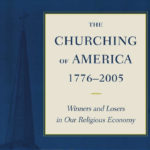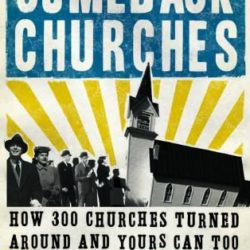By Joe Epley
The story of Gideon should not have ended in victory! History belongs to those who raise mighty armies and crush the enemy through superior strategy and overwhelming force. It belongs to Roman legions or Mongol hordes of countless seasoned veterans fighting for their glorious causes. The biblical retelling of Gideon’s story defied these realities. Instead, 32,000 troops became 300, and swords remained sheathed as ram’s horns, clay pots, and torches morphed into instruments of war that crushed the Midianites in a decisive blow. In the end, the only sword raised was that of each opposing soldier against his own neighbor. The hero of the story, emerging victorious from the battle was not Gideon, but the God who used such underwhelming force and unconventional strategy to win the day for his people.
I recently spoke with pastor Dwight Dozier, a 45-year veteran of pastoral ministry, who served for 20 years in Great Bend, Kansas. It took barely twenty seconds for his passion for making disciples and empowering local churches to bring fresh ministry inspiration. Over the course of his tenure in Great Bend and in the state of Kansas in general, his church has exhausted the definition of what it means to build the church. In the beginning, it resembled financial aid to struggling churches, or helping with building projects and material resources in neighboring churches and communities. As assistance progressed, the financial support continued, but scores of people acting as the hands and feet of Jesus in several counties in the heart of rural Kansas took center stage.
The wave of church planters and ministry teams began when a deacon turned vocational pastor, gave up a good-paying job and committed to a twelve-month internship designed to prepare him for pastoral ministry. Church leaders surrounded him and embraced the goal to equip him to minister effectively and love the community well. Fifteen have passed since the pastor’s initial installment, and the church he pastors continues to thrive. In a church where closure seemed imminent and lacking leadership, one disciple of Christ has now produced many.
Thirty miles away from Great Bend lies another small community of Ness City, with a story that continues the grace of the Lord. In this particular town, a church struggled with a retiring pastor, under ten active members, and a tired building. Simultaneously in Great Bend, a missionary couple returned from the foreign field and embraced a pastoral call from God to plant churches, starting with loving this neighboring community of Ness City. Through a replant and partnership with the church in Great Bend, the church in Ness City today defies the darker chapters of its history and has found growth and new life under the faithful leadership of ministers who chose to be disciples first and leaders second. Neighboring rural communities, La Crosse and Sterling, both follow similar trajectories as healthy disciples begin forming healthy communities of faith.
As we spoke of the work the Lord accomplished through Dozer’s church, we discussed keys that helped accomplish all of this growth. In the next 20 minutes, Dozer expounded on the subject of discipleship in his church. The most impressive point in the conversation, Dozer never addressed the commonly held points of trendy discipleship literature. His discipleship methods held no secret recipe, or five step formula, or even a particularly innovative model that could revolutionize the Gospel as we know it. Instead, I heard an honest heart for discipleship. Not discipleship with good intentions, or a great slogan, or a theologically complex vision statement, but instead, the kind of discipleship that honed belief, fostered community, and inspired action.
Replace the ram’s horns, clay pots, and torches of Gideon with nine months of weekly meetings, accountability partners, and biblical devotions. Imagine a group of people trained to believe in Jesus, develop that belief, and serve their church and community. Picture coffee and conversation as the means that the mundane areas of life become imbued with God’s grace and redeeming power. Now replace Israel’s 32,000 troops with just over 300 men and women who have experienced intentional discipleship over the course of the last decade, and suddenly the victory makes sense. Rural communities touched by Jesus in real and long-lasting ways, and just as in the story of Gideon, God receives all the glory.
Throughout the interview, lessons from Great Bend, Kansas emerged that can serve as guideposts for ministers looking to build the kingdom of God in their rural communities.
1) Disciple Intentionally, not Organically
Small towns tend to function as informal places, to the extent where it can seem natural to believe that proximity and good intentions provide enough relational growth to create mature disciples. However, Dozer spoke of spending the majority of his ministry missing out on the fruits of true discipleship because he expected it to occur naturally. Instead, he encourages leaders to assume that without intentional directed effort on the part of the leader, discipleship will not take root in a meaningful and consistent way.
2) Raise the Bar
Investments count, as simple as it sounds the old saying rings true in discipleship, “You get what you pay for.” People tend to rise to the level of expectations of discipleship. Whatever the discipleship method, it should require real investment from those discipled, whether in the form of monetary or time commitments. Pastors should expect things like daily devotions, scripture memorization, and the practice of serving inside and outside the church as normal discipleship expressions. In raising the bar, discipleship achieves the normative expectation of transforming the human heart to resemble Jesus.
3) Quit Quitting on Accountability
If someone recorded the launch of every meaningful discipleship program, they would possibly fill a library’s worth of books available for the church; however, stories written for those who followed through with discipleship programs would hardly fill a bookshelf. Whether the pastor needs accountability to follow through with discipleship commitments, or the people need accountability on their discipleship journey, if no one “checks in,” discipleship will eventually cease.
Given the opportunity to charge into battle, one would not pick ram’s horns, clay pots, or torches. They seem like tools that would certainly not accomplish the task. Most would also take all the help available instead of turning away 31,700 people. However, God tends to use common and even ordinary items and people to great effect. Discipleship reflects many similarities as the steady march of Christian people walking with their God, increase in Christlikeness, and affect the world around them. Discipleship occurs during coffee and meals, Bible studies and a devotional life reflecting authentic and accountable communities. Ultimately, it demonstrates a call to recapture the methods and rekindle the passions of the master teacher, Jesus of Nazareth, for the sake of reaching the world with His message.
Discipleship at Encounter Church in Great Bend, Kansas brings a community closer to the Savior that stretches to surrounding communities. Like Gideon, the church of Jesus tends to win great spiritual victories as it follows simple but profound practices that impact far beyond the boundaries of the local church and community.





















